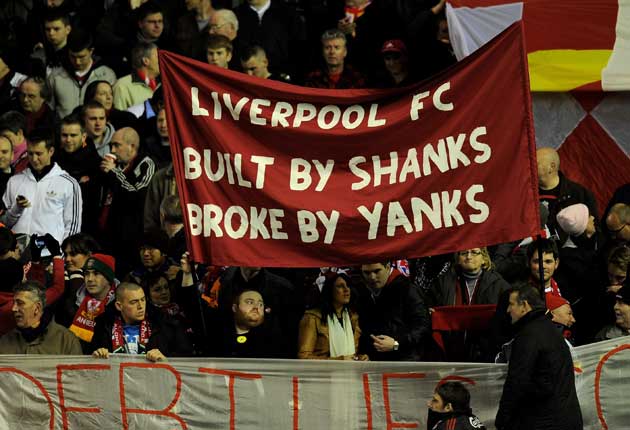£100m investment offer is strictly business
Bidders targeting 40 per cent stake in Liverpool are unlikely to want influence on the pitch

Your support helps us to tell the story
From reproductive rights to climate change to Big Tech, The Independent is on the ground when the story is developing. Whether it's investigating the financials of Elon Musk's pro-Trump PAC or producing our latest documentary, 'The A Word', which shines a light on the American women fighting for reproductive rights, we know how important it is to parse out the facts from the messaging.
At such a critical moment in US history, we need reporters on the ground. Your donation allows us to keep sending journalists to speak to both sides of the story.
The Independent is trusted by Americans across the entire political spectrum. And unlike many other quality news outlets, we choose not to lock Americans out of our reporting and analysis with paywalls. We believe quality journalism should be available to everyone, paid for by those who can afford it.
Your support makes all the difference.Day-to-day footballing life gets no easier for Liverpool, with yesterday's preoccupation being the task of juggling players for the Europa League match with Lille and Sunday's momentous trip to Old Trafford. But there is some genuine hope on the financial horizon with the emergence of an investment fund, Rhône Group, willing to invest £100m for a 40 per cent share of the club.
There may well be other parties ready to challenge Rhône's proposal in the next few weeks and perhaps drive up the price to a figure which values the club higher, but one of the critical points about the proposal on the table at Anfield is that it is devoid of personalities with an emotional attachment to the club and the resulting determination to be directly involved in it.
Rhône might be a financial organisation with colourful personalities attached, in Robert Agostinelli and Steve Langman. But contrary to football's unquenchable desire for characters, a trait which so often makes it seem more a pantomime than a multi- billion-pound business, these biographical back stories mean nothing.
Agostinelli and Langman evidently like their football, and so do their children. One of Rhône's Swedish partners also has a following for the game. But none of these individuals will command or crave the size of personality at Liverpool of a Tom Hicks or George Gillett if the company does, indeed, become a 40 per cent shareholder in the club. The Rhône fundholders will make the decision to invest and leave the running of the business to the club's managing director, Christian Purslow, and that will be that.
Purslow certainly adheres to the culture of business minus personality, where the pursuit of new equity partners is concerned. He does not know the Rhône's partners personally. The Rhône management fund's interest in Liverpool is down to the business plan for the club placed before them, not personal relationships. This is the way Purslow has operated throughout his six-month pursuit of the new investor Liverpool need to enable them pay down £100m debt which Royal Bank of Scotland want back.
Football ownership could certainly do with a long period of the cool detachment and passivity. The game has gradually awoken slowly to the penalties which are attached to a desire from wealthy proprietors to be actively involved in clubs. Witness the travails of Chelsea, with four managers in seven years and conjecture this week of a possible eighth if Carlo Ancelotti does not win the Premier League for Roman Abramovich. Say all you want about the Glazers, but no one is disagreeing that their reluctance to partake in the pantomime is anything but a good thing. It is an observation Sir Alex Ferguson returns to every time their name crops up – or at least on those occasions when he deigns to enter a discussion, rather than spit out those immortal words of his "I'm 'nae getting into that". Liverpool will happily take that kind of non-interventionist culture.
Though it might reasonably be argued that the best outcome for the club and Purslow is to find an investor who will take over the club entirely and buy out Hicks and Gillett – thereby preventing any prospect of the stasis which some fear a three-way ownership between Hicks, Gillett and AN Other might create – the club will certainly be able to put the turbulent last three years in the past if Rhône do turn out to be the majority shareholders at Liverpool.
It would mean that RBS can be paid off, the current ownership deadlock broken, a better debt facility agreed, potential capital released for the creation of a new stadium and, further down the road, the possibility that other investors, potentially fans or businesses, may be brought on board as part of a newly defined public company.
Rhône seems to perceive that vision. A source suggested yesterday that they would like to see Liverpool run within its means "on the same lines as Arsenal". Liverpool reserve judgment on precisely who their partner will be but it certainly makes for a less colourful commercial future. It is not a dream outcome for the headline writers or those who care to make banners from bedsheets – but after the travails they have gone through, the club can live with that.
Join our commenting forum
Join thought-provoking conversations, follow other Independent readers and see their replies
0Comments